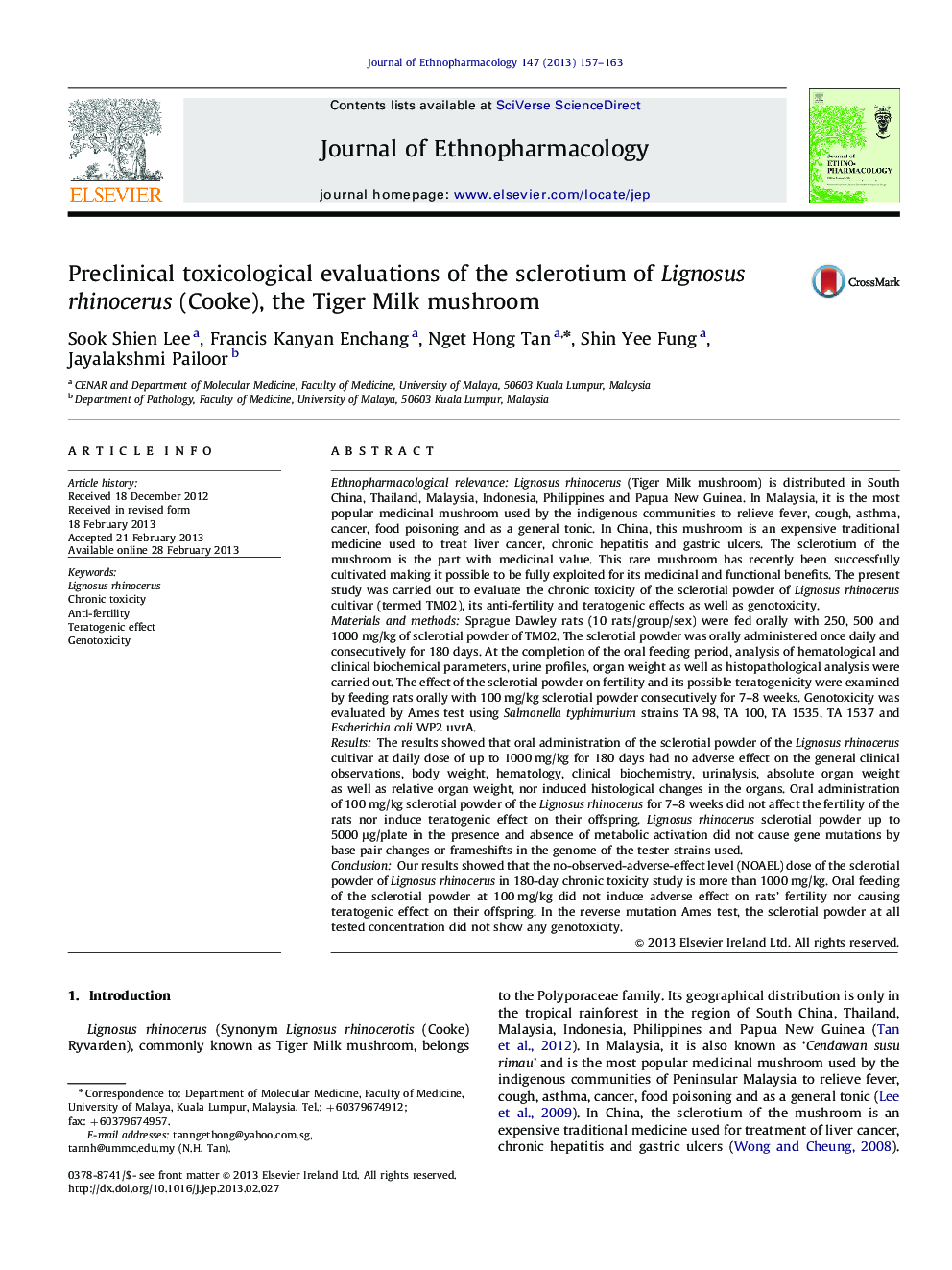| کد مقاله | کد نشریه | سال انتشار | مقاله انگلیسی | نسخه تمام متن |
|---|---|---|---|---|
| 5837531 | 1123967 | 2013 | 7 صفحه PDF | دانلود رایگان |
Ethnopharmacological relevanceLignosus rhinocerus (Tiger Milk mushroom) is distributed in South China, Thailand, Malaysia, Indonesia, Philippines and Papua New Guinea. In Malaysia, it is the most popular medicinal mushroom used by the indigenous communities to relieve fever, cough, asthma, cancer, food poisoning and as a general tonic. In China, this mushroom is an expensive traditional medicine used to treat liver cancer, chronic hepatitis and gastric ulcers. The sclerotium of the mushroom is the part with medicinal value. This rare mushroom has recently been successfully cultivated making it possible to be fully exploited for its medicinal and functional benefits. The present study was carried out to evaluate the chronic toxicity of the sclerotial powder of Lignosus rhinocerus cultivar (termed TM02), its anti-fertility and teratogenic effects as well as genotoxicity.Materials and methodsSprague Dawley rats (10 rats/group/sex) were fed orally with 250, 500 and 1000 mg/kg of sclerotial powder of TM02. The sclerotial powder was orally administered once daily and consecutively for 180 days. At the completion of the oral feeding period, analysis of hematological and clinical biochemical parameters, urine profiles, organ weight as well as histopathological analysis were carried out. The effect of the sclerotial powder on fertility and its possible teratogenicity were examined by feeding rats orally with 100 mg/kg sclerotial powder consecutively for 7-8 weeks. Genotoxicity was evaluated by Ames test using Salmonella typhimurium strains TA 98, TA 100, TA 1535, TA 1537 and Escherichia coli WP2 uvrA.ResultsThe results showed that oral administration of the sclerotial powder of the Lignosus rhinocerus cultivar at daily dose of up to 1000 mg/kg for 180 days had no adverse effect on the general clinical observations, body weight, hematology, clinical biochemistry, urinalysis, absolute organ weight as well as relative organ weight, nor induced histological changes in the organs. Oral administration of 100 mg/kg sclerotial powder of the Lignosus rhinocerus for 7-8 weeks did not affect the fertility of the rats nor induce teratogenic effect on their offspring. Lignosus rhinocerus sclerotial powder up to 5000 μg/plate in the presence and absence of metabolic activation did not cause gene mutations by base pair changes or frameshifts in the genome of the tester strains used.ConclusionOur results showed that the no-observed-adverse-effect level (NOAEL) dose of the sclerotial powder of Lignosus rhinocerus in 180-day chronic toxicity study is more than 1000 mg/kg. Oral feeding of the sclerotial powder at 100 mg/kg did not induce adverse effect on rats' fertility nor causing teratogenic effect on their offspring. In the reverse mutation Ames test, the sclerotial powder at all tested concentration did not show any genotoxicity.
Graphicak abstract182
Journal: Journal of Ethnopharmacology - Volume 147, Issue 1, 2 May 2013, Pages 157-163
